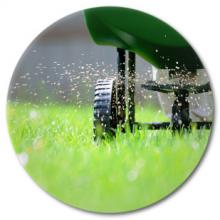Lawncare and Gardening
 Unknowingly, you may be contributing to stormwater pollution while working to keep your lawn green. Inefficient and broken sprinklers create runoff that carries pesticides and fertilizers into the storm drain system. Grass clippings, leaves and other yard waste gets swept or blown into the street, clogging catch basins and polluting waterways. Following a few green tips is all it takes to prevent stormwater pollution.
Unknowingly, you may be contributing to stormwater pollution while working to keep your lawn green. Inefficient and broken sprinklers create runoff that carries pesticides and fertilizers into the storm drain system. Grass clippings, leaves and other yard waste gets swept or blown into the street, clogging catch basins and polluting waterways. Following a few green tips is all it takes to prevent stormwater pollution.
Pesticides and fertilizers:
- Read the product label and follow directions for use.
- Avoid applying near driveways or gutters.
- Spot apply pesticides and herbicides, rather than blanketing an entire area.
- Never apply fertilizer or pesticide before a rain.
- Never dump pesticides into the gutter or a storm drain. Take unwanted lawn and garden chemicals to a free household hazardous waste collection site. Call (800) CLEANUP for the location of your city’s facility.
- Store fertilizers, pesticides and other toxic garden chemicals in a covered area and in sealed, waterproof containers. Take unwanted lawn or garden chemicals to a household hazardous waste collection facility. Call (800) CLEANUP.
- Use non-toxic products for your garden and lawn whenever possible.
Yard waste:
- Recycle leaves, grass clippings and other yard waste, instead of blowing, sweeping or hosing them into the street or gutter.
- Try grasscycling, leaving grass clippings on your lawn instead of using a grass catcher. The clippings act as a natural fertilizer and because grass is mostly water, it also irrigates your lawn, conserving water.
- Prevent erosion, which washes sediment, debris and toxic runoff into the storm drain system, polluting waterways. Prevent erosion and sediment runoff by using ground cover, berms and vegetation down-slope to capture run-off. Avoid excavation or grading during wet weather.
Wise water use:
- Cut your water costs and prevent runoff by controlling the amount of water and direction of sprinklers. Periodically inspect and fix leaks and misdirected sprinklers.
- The average lawn needs about an inch of water a week, including rainfall, or 10 to 20 minutes of watering. A half-inch per week is enough for fall and spring.
- Water your lawn early in the morning so water has time to soak into the soil before the heat of the sun causes evaporation. Sprinklers should be left on long enough to allow water to soak into the ground but not so long to cause runoff.
- Using drip irrigation, soaker hoses or micro-spray systems for flower beds and vegetation can also help reduce your water bill and prevent runoff.
- Save on water by planting low maintenance, drought-tolerant trees and shrubs.
Visit our Pinterest page for some DIY all natural pesticide and fertilizer recipes!




